
views
X
Trustworthy Source
Centers for Disease Control and Prevention
Main public health institute for the US, run by the Dept. of Health and Human Services
Go to source
Although there is no way to cure the flu, you can treat its symptoms using home remedies, take over-the counter or prescription medicines, and take steps to avoid getting the flu in the future.
Home Remedies

Use steam. Nasal and sinus congestion are common symptoms of the flu. If you are suffering from congestion, using steam may give you some relief. The heat of the steam loosens mucus while the moisture helps to relieve dry nasal passages. Try a hot shower or bath to help to clear your congestion faster. Turn the water as hot as you can stand it and let the bathroom fill with steam with the door closed. If the heat leaves you feeling a little weak or dizzy, stop immediately and do not continue. When you get out of the shower, dry your hair and body thoroughly. Damp hair can cause you to lose body heat, which is not good when you are sick. You can also use steam by filling your bathroom sink with hot water and placing your face over it. Drape a towel over your head to keep the steam in. You can even add a couple of drops of a sinus-clearing essential oil, such as eucalyptus, or peppermint, to maximize the sinus-clearing benefits.
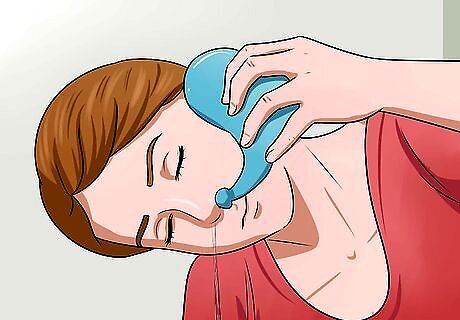
Try a Neti pot. The Neti pot clears nasal passages by thinning and flushing the sinuses with a saline solution. The Neti pot is an oblong ceramic or clay teapot that can be purchased online, in health food stores, and in some pharmacies; however, any kind of bottle or container with a thin spout can also be used. Buy the saline solution used in the Neti pot in health food or drug stores; however, you can make your own saline solution by mixing half a teaspoon of kosher salt into a cup of sterile water. It is essential that the water is sterile or properly distilled — ensure this by boiling the water for five minutes, then allow it to cool to room temperature. Fill the pot with the saline solution and, tilting your head to one side over a sink, insert the spout of the pot into one nostril. Slowly pour the solution in, which should flow in one nostril before coming out the other. When the water stops dripping, blow your nose gently, then repeat the process on the opposite side.
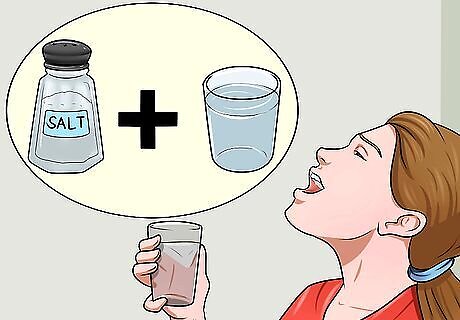
Gargle with salt water. A dry, tickly, or sore throat is a common symptom of the flu. An easy, natural way to deal with this is to gargle a salt solution. The water hydrates the throat and the antiseptic properties of the salt fight infection. Make a gargling solution by dissolving a teaspoon of salt in a glass of warm to hot water. If you don’t like the taste, add a pinch of baking soda to ease the saltiness. You can also try gargling with apple cider vinegar and warm water for a similar effect. Gargle this solution up to four times a day.
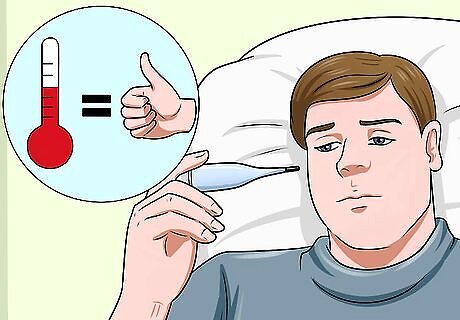
Allow a mild fever to run its course. A fever is your body’s way of fighting off the infection, so it is ok to let it go untreated if your temperature is less than 101°F (38.3°C). It is thought that the fever will heat up your body and blood, which makes it easier for your body to fight off the infection, or that the virus may be unable to replicate as easily when your body is at a higher temperature. However, there is no evidence to suggest that taking Tylenol to bring down a fever would prevent your immune system from working at its best. You can likely take Tylenol to relieve your symptoms with no fear of additional harm, but you can always check with your doctor if you're unsure. Seek medical attention if your fever goes above 101°F (38.3°C). Seek treatment for an infant under 12 months old with any type of fever.
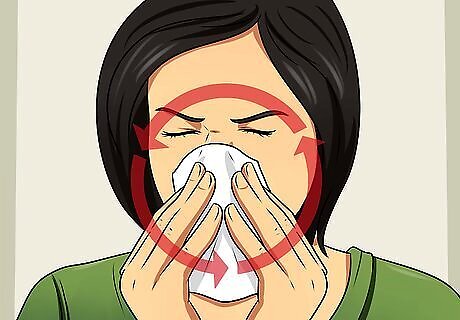
Blow your nose as often as possible. Blowing your nose often is the best way to get excess mucus out of your sinuses and nasal passages when you are sick with the flu. Do not inhale mucus back into your nose because that can lead to sinus pressure and earaches. To blow your nose, hold a tissue over your nose with both hands. The tissue should be covering your nostrils so that the tissue will catch the mucus when you blow your nose. Then apply gentle pressure on one nostril and blow out through the other one. Dispose of used tissues immediately and wash your hands to minimize the spread of germs.
Self-Care
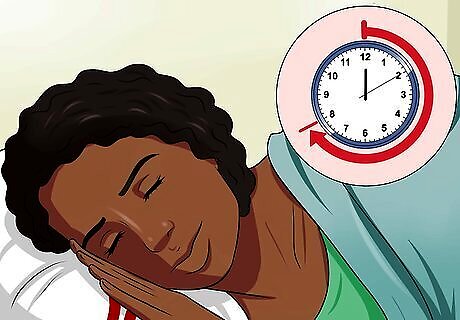
Rest as much as possible. When you're sick, your body works hard to get you better. This drains all of your energy from your body, meaning you will be more tired than usual. This also means you need to rest more, since your body is working so hard. If you try doing more than you have to, you can make your flu last longer and make your symptoms worse. At least eight hours of sleep per night is ideal, but you will probably need even more when you're sick. Sleep in and take naps throughout the day. Take time off of work or school so you can get adequate rest.

Keep yourself warm. Keeping your body temperature up will help speed up your recovery. Make sure that you turn on the heat in your house, so that it is warm enough for you. You can also stay warm by wearing a fuzzy robe, by staying under the covers, or by using a portable heater. Dry heat can bother your nose and throat, causing them to dry out even more and making your symptoms worse. Try using a humidifier in the room where you spend most of your time. This will add moisture back into the air, which can ease coughing and congestion.

Stay home. When you are sick, you need to rest. It is the only way to regain your strength and let your body recuperate. If you go into work or school while you are sick, you will be spreading your germs to those around you. Also, when you are sick with the flu, your immune system is weaker. This means you might pick up other illnesses from those around you and you could be sick longer. Ask your doctor for a note to excuse you from work or school for a few days.
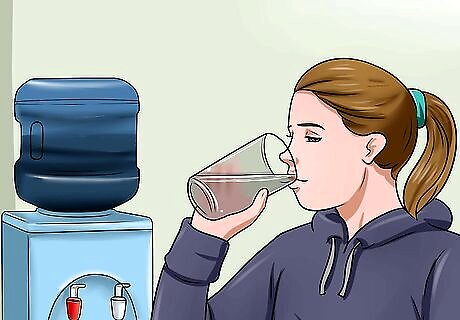
Drink plenty of fluids. Blowing your nose a lot and sweating due to fever and increased environmental heat causes you to lose hydration. This can worsen flu symptoms and cause more symptoms, such as headaches and a dry, irritated throat. Try to drink more fluids than average when you're sick. You can drink decaffeinated hot tea, an electrolyte solution like PediaLyte, diluted sports drinks, eat soups and water-heavy fruit and vegetables such as watermelon, tomato, cucumber, and pineapple, or drink more juice and water. Avoid sugary sodas because soda acts as a diuretic, which causes you to urinate more and lose water. Drink ginger ale if you have an upset stomach, but drink more water. To check for dehydration, examine your urine. Very pale yellow or almost clear means you’re well-hydrated. When urine is dark yellow, you may be dehydrated and you should drink more water.
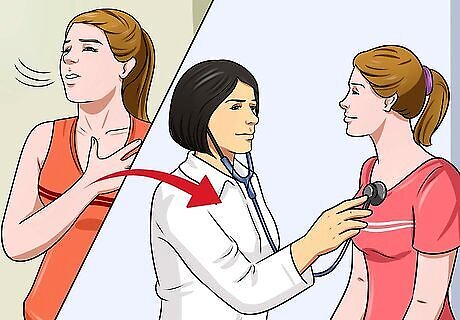
Seek medical help if necessary. There is no way to cure the flu after getting it, so you will just have to ride it out. Once you have the flu, symptoms generally last seven to 10 days. If your symptoms last more than two weeks, make sure that you contact your doctor. You should also contact your doctor if you have: Difficulty breathing or chest pain Sudden dizziness or confusion Severe or persistent vomiting Seizures Flu-like symptoms that improve but then return with fever and worse cough Change in mental status in a young child (i.e. more drowsy than usual/not waking up to stimulation like normal)
Medications
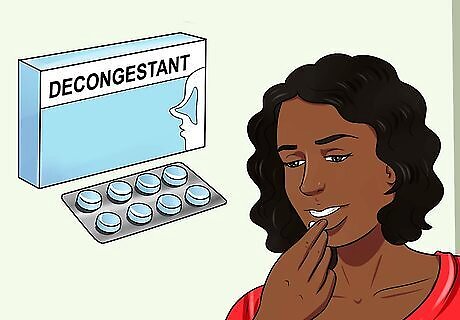
Take oral decongestants. Nasal decongestants help shrink swollen blood vessels in the nasal membranes and allow the nasal passages to open up. The two oral decongestants available over-the-counter in tablet form include phenylephrine, such as Sudafed PE, and pseudoephedrine, such as Sudafed. Side effects of oral decongestants include insomnia, dizziness, increased heart rate, and increased blood pressure. Do not use oral decongestants if you have heart issues or high blood pressure. Use under a doctor's care if you have diabetes, thyroid problems, glaucoma, or prostate issues.
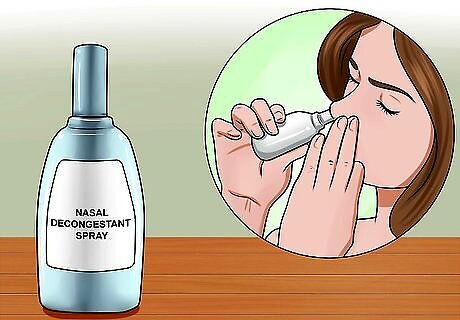
Use spray decongestants. You can also take over-the-counter decongestants in nasal spray form. Nasal sprays can provide immediate and effective relief from congestion, which can be administered in one or two quick squirts. Nasal sprays can contain oxymetazoline, phenylephrine, xylometazoline, or naphazoline as a decongestant. Be sure to use the nasal spray only as often as directed. Using it for more than three to five days can cause you to feel stuffier after discontinuing use. This is called the "rebound effect."
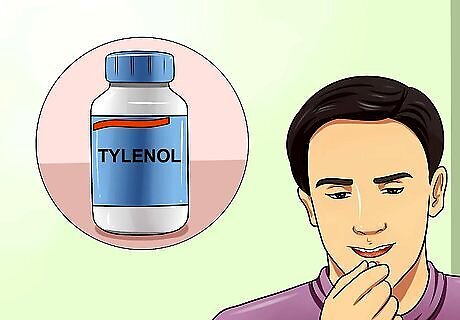
Try pain relievers and fever reducer. If you have a fever and aches and pains, you can take over-the-counter medicine for relief. The main pain relievers and fever reducers are acetaminophen, such as Tylenol, or NSAIDs, which are non-steroidal anti-inflammatory drugs such as ibuprofen or naproxen. Avoid taking NSAIDs if you have acid reflux or peptic ulcer disease. These medications can upset your stomach. If you are already taking an NSAID for other issues such as blood clots or arthritis, talk to your doctor before taking the medicine. Many multi-symptoms medicines contain acetaminophen. Make sure you take the appropriate amount because an overdose can lead to liver toxicity. Do not give aspirin to children or teenagers, especially if they are exhibiting flu-like symptoms. This is linked to a serious liver failure disorder called Reye's Syndrome.
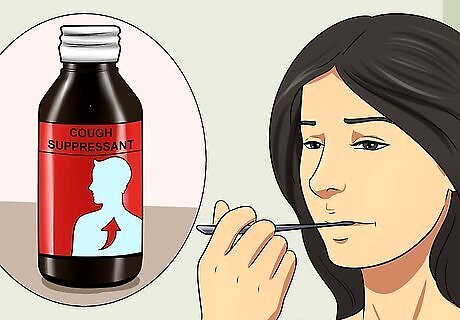
Use a cough suppressant. If you have a severe cough, try a cough suppressant. Cough suppressants include dextromethorphan and codeine, though codeine will likely need a prescription. Dextromethorphan is available as a tablet or syrup and can come in combination with an expectorant. Side effects of these types of medications can include drowsiness and constipation. The dosages of these medications vary depending on what you buy and how strong it is, so always follow doctor’s and manufacturer’s directions.
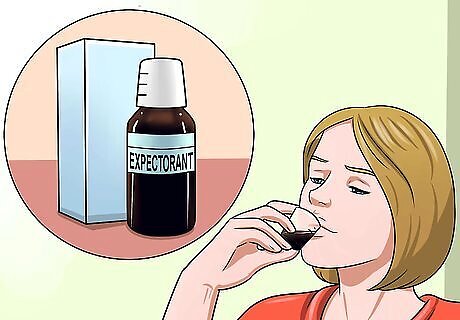
Try an expectorant. Chest congestion is a common flu symptom. To help cure it, you can try an expectorant. Expectorants are medicines that loosen and reduce mucus in your chest. Less mucus will help you breathe better and make your coughs more productive. Many over-the-counter medications for cold and flu have expectorants in them, which can be liquid, liquid gels, or tablet form. If you are unsure about what kinds to take, ask your doctor or pharmacist. Also ask about common side effects of expectorants, which can include drowsiness, vomiting, and nausea.
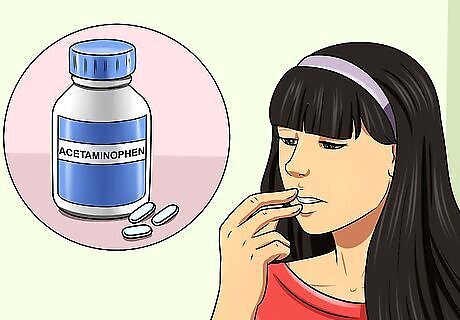
Consider an over-the-counter multi-symptom medicine. There are countless combination over-the-counter medicines that contain a lot of these different medications. These are helpful if you experience multiple symptoms at the same time. Most contain a fever reducer and pain reliever such as acetaminophen, a decongestant, a cough suppressant, and sometimes an antihistamine to help you sleep. If you are taking a combination medicine, make sure not to take other medications that may duplicate what is in the multi-symptom. This can lead to overdoses. Examples include Tylenol Cold Multi-Symptom, Robitussin Severe Multi-Symptom Cough Cold & Flu Nighttime, DayQuil Cold & Flu, etc.
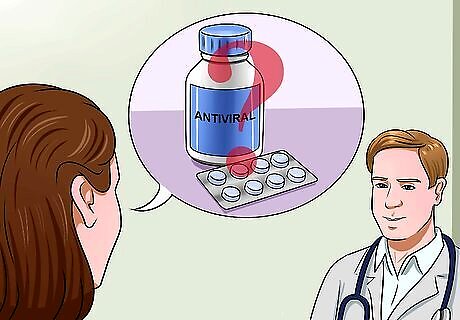
Ask your doctor about a prescription antiviral medication. "The flu" is sort of a general layman's term that is often referring to the common cold in severe form. Influenza is one specific virus (the Influenza Type A or B virus) that causes severe symptoms and can be life-threatening for infants and the elderly. If your doctor determines that you have Influenza, he may also prescribe antiviral medications to household members for prevention, especially if they are at high risk, such as someone with a chronic disease or who is older than 65. Antiviral influenza drugs work to reduce the severity and duration of the illness by a couple days, control outbreaks in close quarters or to other members of your family, and possibly reduce complications from the flu. These medications include: Oseltamivir (Tamiflu) Zanamivir Amantadine and Rimantadine (some influenza strains are resistant to these drugs)
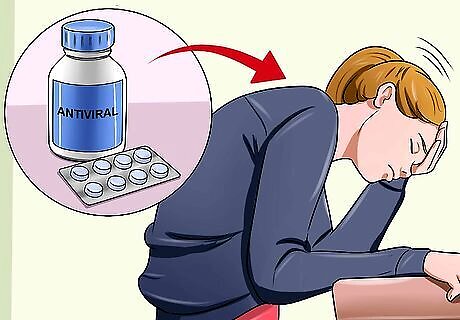
Know the side effects of antivirals. To be effective, antiviral drugs must be started within 48 hours of becoming sick and should be taken for five days; however, a number of flu viruses have developed resistance to some antiviral medications. Taking these may also help contribute to other strains of the flu becoming resistant. Though uncommon, side effects of antivirals medications can include: Nausea, vomiting, or diarrhea Dizziness Stuffy or runny nose Headache Cough
Flu Vaccine
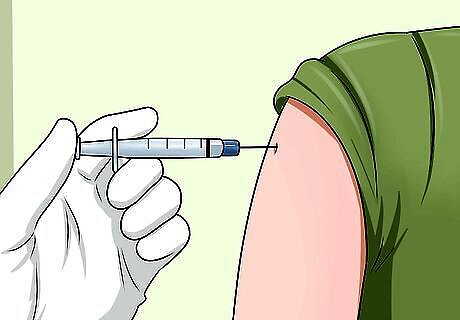
Get a flu shot. The single best way to treat any disease is to prevent it. Anyone over six months old should get the flu shot, which specifically targets the influenza virus. This is especially important for anyone at risk of complications from the flu and those who are in contact with those who are especially at risk. This includes those ages 65 or older, young children, women who are pregnant, those with depressed immune systems (such as those undergoing chemotherapy), or those with chronic health conditions like asthma or diabetes. If you are a parent or caretaker for a person with the risk factors just described, or a health care worker, it is important you get the flu shot too to protect these people. Flu season is October to May, with its peak December to February.. Around this time, flu shots, which are vaccines, are available at most pharmacies. Most insurances cover this cost. Get the vaccine few weeks before the season starts. The vaccine takes a good two weeks to fully kick in, by helping you develop antibodies to the flu so you can fight it off; however, getting it early will help you not contract it during the two weeks you are susceptible to the flu. You can also get the flu shot if you're currently experiencing mild flu-like symptoms. Some people believe that flu symptoms are a contraindication for the flu shot, or a reason you shouldn't get it, but this is a common misconception. The vaccine is only effective for one flu season, so you must get it every year. It also only covers some strains of the flu. Also worth noting is that flu vaccine manufacturers in partnership with doctors basically have to guess which flu strains will be prominent that year and make the vaccine to include those strains. Some years they are wrong, and the vaccine is not effective because it didn't contain the strains that end up being prevalent that season.
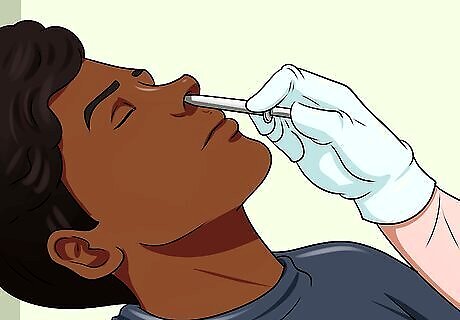
Try the nasal spray vaccine. Other than the flu shot, you can get the flu vaccine as a nasal spray. This could be easier for some people, but should be avoided by others. You should not take the nasal spray vaccine if: You are younger than two or older than 49 You have heart disease You have lung disease or asthma You have kidney disease or diabetes You've had previous problems with your immune system You are pregnant You have active respiratory symptoms like running nose, cough, etc.
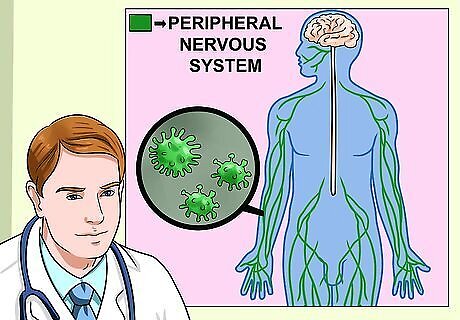
Understand the complications. There are some complications that can arise if you receive either vaccine. Before getting either vaccine, talk to your doctor if: You are allergic to, or have previously had an allergic to, flu shots or eggs in the past. There is a different flu shot for those with an egg allergy. If you have a moderate to severe illness with a fever. You should wait until you recover before getting the vaccine. You have the rare nerve disorder, Guillain-Barré syndrome, in which your immune system attacks your peripheral nervous system. If you have multiple sclerosis.
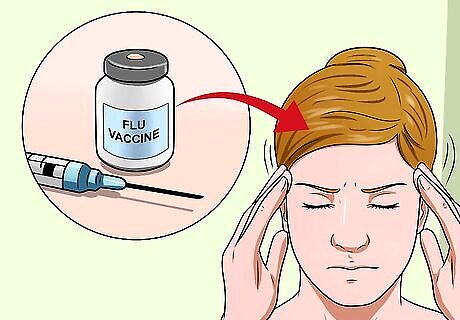
Be aware of the potential side effects of the vaccine. Despite all the good that flu vaccines do, there are some side effects of the flu shot. These can include: Soreness and swelling at the injection site Headaches Fever Nausea Mild flu like symptoms
Preventing the Flu

Avoid sick people. To prevent the flu, avoid coming into close contact with people who have the flu. Close contact includes coming close to the mouth, so avoid kissing or hugging those with the flu. You should also avoid an infected person if they sneeze or cough near you. Any bodily fluid can transfer the flu germs. Also avoid touching surfaces the infected individual touched, which will be contaminated with germs.
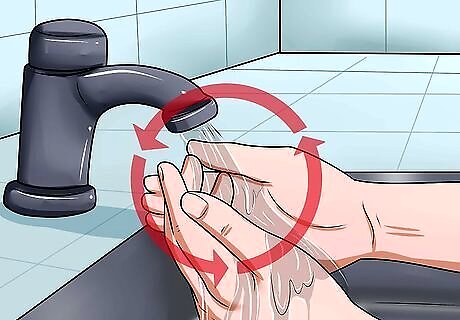
Wash your hands frequently. Proper hand washing is the best way to prevent all kinds of infections. When you are in public or around a sick individual, you should wash your hands frequently. Carry hand sanitizer with you to use when you may not have access to a sink. According to the Center for Disease Control (CDC), proper hand washing technique is as follows: Get your hands wet with clean, running water. It can be either warm or cold. Next, turn off the tap and apply soap. Lather the soap into your hands by rubbing them together. Don’t forget the backs of your hands as well as in between your fingers and under your fingernails. Rub your hands together for at least 20 seconds, which is about the length of time it takes to sing the traditional version of “Happy Birthday" twice. Next, turn the faucet back on and rinse off the soap with warm water. Take a clean towel and dry them. You can also air dry them with a hand dryer.

Follow a healthy diet. A healthy lifestyle can keep your immune system strong and help fight off infections. You should eat a healthy diet rich in fruits and vegetables. You should also decrease your intake of fats, especially saturated fats, as well as sugar. Vitamin C is an immune boosting vitamin. Although there is mixed evidence on its effectiveness to reduce symptoms, a healthy diet rich in vitamins and vitamin C doesn't hurt. Eat more citrus fruit, such as oranges and grapefruit, as well as cantaloupe, mangoes, papaya, watermelon, broccoli, green and red peppers, and leafy greens.

Stay stress-free. Practicing yoga, tai chi, or meditation can help you relax on a daily basis. If you feel stressed out, it's important for your health to take some time for yourself every day, even if it's just ten minutes at a time. This can give your immune system that boost it needs. Stress also messes with your hormones and may reduce your ability to fight infection.

Exercise most days of the week. Research says that exercise may cut your risk of flu and make your flu shot more effective. Do at least 30 minutes of moderate aerobic exercise, or exercise that increases your heart rate, most days of the week. This keeps your body working in top form and helps your fight against different infections. Researchers don't exactly know how or why, but there are a few theories about how exercise can help fight different bacterial or viral infections. It is suggested that it flushes out bacteria from the lungs, through urine, and through sweat. It also is suggested that exercising sends antibodies and white blood cells through the body at a quicker speed, detecting illness earlier, and that the rise in body temperature prevents bacterial growth.
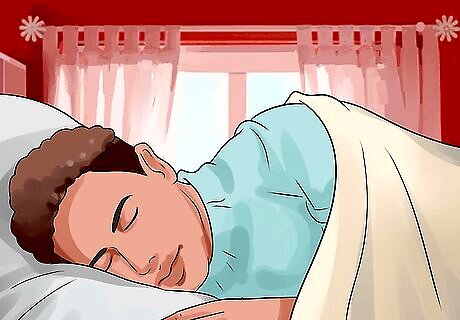
Get enough sleep. Chronic sleep loss can have many effects, including lowering your immune system. To stay healthy, it's important you get enough sleep every night. Adults should get between 7.5 to nine hours of sleep.




















Comments
0 comment